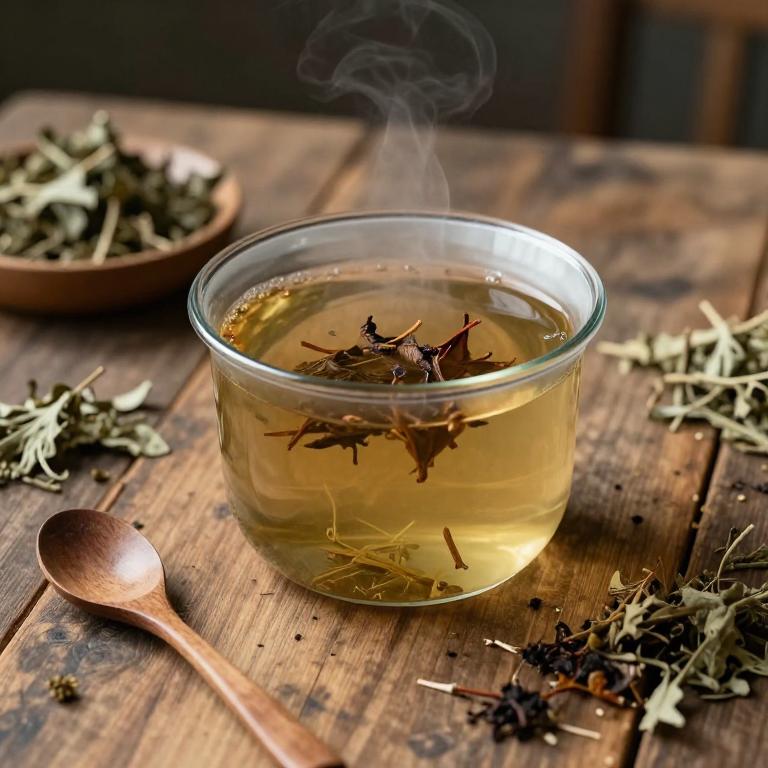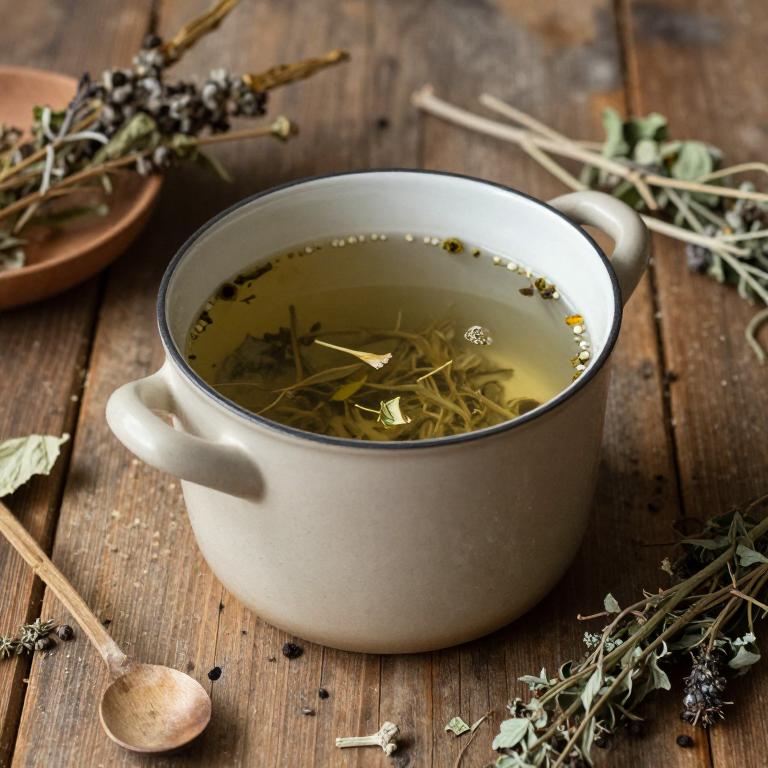10 Best Herbal Decoctions For Nose Bleeding

Herbal decoctions have been traditionally used to address nose bleeding, or epistaxis, by promoting nasal health and reducing inflammation.
Common herbs such as yarrow, chamomile, and licorice root are often included in these decoctions due to their antiseptic, anti-inflammatory, and hemostatic properties. To prepare a decoction, the herbs are boiled in water for several minutes, then strained and consumed as a tea or applied topically to the nasal passages. This natural approach is believed to help soothe irritated nasal tissues and prevent excessive bleeding.
While herbal decoctions may offer relief, they should be used under the guidance of a qualified herbalist or healthcare provider to ensure safety and effectiveness.
Table of Contents
- 1. St. john's wort (Hypericum perforatum)
- 2. Yarrow (Achillea millefolium)
- 3. Stinging nettle (Urtica dioica)
- 4. Salvia (Salvia officinalis)
- 5. Marigold (Calendula officinalis)
- 6. Echinacea (Echinacea purpurea)
- 7. Rosemary (Rosmarinus officinalis)
- 8. Sanguisorba (Sanguisorba officinalis)
- 9. Dog rose (Rosa canina)
- 10. Blessed thistle (Cnicus benedictus)
1. St. john's wort (Hypericum perforatum)

Hypericum perforatum, commonly known as St. John's wort, is traditionally used in herbal medicine for its purported anti-inflammatory and astringent properties.
While it is more widely recognized for its use in treating mild depression, some traditional practices suggest it may help in managing nosebleeds by reducing nasal inflammation and promoting tissue healing. Herbal decoctions of Hypericum perforatum are typically prepared by simmering the dried plant material in water, allowing the active compounds to be extracted. However, it is important to note that scientific evidence supporting its efficacy for nosebleeds is limited, and its use should be approached with caution, especially when combined with other medications due to potential interactions.
As with any herbal remedy, consultation with a healthcare professional is recommended before use, particularly for individuals with underlying health conditions or those undergoing medical treatment.
2. Yarrow (Achillea millefolium)

Achillea millefolium, commonly known as yarrow, has been traditionally used in herbal medicine for its potential hemostatic properties.
Herbal decoctions made from dried yarrow leaves and flowers are often prepared by simmering them in water for several minutes, creating a concentrated infusion. These decoctions are believed to help reduce excessive nose bleeding by promoting blood clotting and strengthening blood vessels. Some studies suggest that compounds in yarrow, such as achilleine and azulene, may contribute to its anti-inflammatory and antiseptic effects.
However, it is important to consult a healthcare professional before using yarrow decoctions, especially for persistent or severe nosebleeds, as they may interact with certain medications or conditions.
3. Stinging nettle (Urtica dioica)

Urtica dioica, commonly known as stinging nettle, has been traditionally used in herbal medicine for its anti-inflammatory and astringent properties.
When prepared as a decoction, it may help reduce excessive bleeding by tightening blood vessels and promoting coagulation. However, it is important to note that while some anecdotal evidence suggests its potential use for nosebleeds, there is limited scientific research supporting its efficacy for this specific condition. The decoction is typically made by boiling the dried leaves and roots in water for several minutes, then allowing it to steep.
As with any herbal remedy, it should be used with caution and under the guidance of a qualified healthcare provider, especially for individuals with bleeding disorders or those taking anticoagulant medications.
4. Salvia (Salvia officinalis)

Salvia officinalis, commonly known as sage, has been traditionally used in herbal medicine for its various health benefits, including its potential role in managing nose bleeding.
Herbal decoctions made from sage leaves are believed to have astringent properties that can help reduce excessive nasal discharge and constrict blood vessels, thereby minimizing bleeding. These decoctions are often prepared by simmering the dried leaves in water for an extended period to extract their active compounds. While some studies suggest that sage may support healing and reduce inflammation in the nasal passages, it is important to consult a healthcare professional before using sage for nose bleeding, especially if the cause is unknown or if there are underlying health conditions.
Overall, sage herbal decoctions may serve as a complementary therapy, but they should not replace conventional medical treatment for persistent or severe nose bleeding.
5. Marigold (Calendula officinalis)

Calendula officinalis, commonly known as pot marigold, has been traditionally used in herbal medicine for its anti-inflammatory and astringent properties.
When prepared as a herbal decoction, it may help in reducing inflammation and promoting healing in the nasal passages, which can be beneficial for individuals experiencing nose bleeding. The decoction is typically made by simmering the dried flowers in water for an extended period to extract their active compounds. However, it is important to consult a healthcare professional before using calendula decoctions, especially for persistent or severe nosebleeds, as they may interact with other medications or underlying health conditions.
While some studies suggest potential benefits, more research is needed to fully understand its efficacy and safety in treating nose bleeding.
6. Echinacea (Echinacea purpurea)

Echinacea purpurea, a popular herbal remedy, is often used in herbal decoctions to support immune function and reduce inflammation.
While it is commonly associated with colds and respiratory infections, some traditional and alternative medicine practices suggest it may help in managing nose bleeding by promoting healing and reducing irritation in the nasal passages. Herbal decoctions made from Echinacea purpurea typically involve simmering the dried root or leaves in water to extract its active compounds, which may have antiseptic and anti-inflammatory properties. However, there is limited scientific evidence directly linking Echinacea to the prevention or treatment of nose bleeding, and its effectiveness can vary depending on the individual and the specific formulation used.
It is advisable to consult a healthcare professional before using Echinacea for nose bleeding, especially if other underlying conditions are present.
7. Rosemary (Rosmarinus officinalis)

Rosmarinus officinalis, commonly known as rosemary, has been traditionally used in herbal medicine for its various therapeutic properties, including its potential to support nasal health.
Rosemary herbal decoctions, prepared by boiling the leaves in water, are believed to possess anti-inflammatory and astringent qualities that may help in reducing nasal irritation and bleeding. These decoctions are often used in complementary medicine to soothe the nasal passages and promote healing of minor nosebleeds. However, it is important to consult a healthcare professional before using rosemary decoctions, as they may interact with certain medications or conditions.
While anecdotal evidence supports its use, scientific research on the efficacy of rosemary for nose bleeding is limited, emphasizing the need for further study.
8. Sanguisorba (Sanguisorba officinalis)

Sanguisorba officinalis, commonly known as common sanguisorba, has been traditionally used in herbal medicine for its hemostatic properties.
Its decoctions are believed to help in reducing nose bleeding by promoting blood coagulation and strengthening blood vessels. The plant contains various bioactive compounds such as tannins, flavonoids, and mucilage, which contribute to its astringent and anti-inflammatory effects. To prepare the decoction, the dried roots or leaves are boiled in water and consumed as a tea or applied topically.
While some studies suggest its efficacy in managing nosebleeds, it is important to consult a healthcare professional before using it, especially for prolonged or severe cases.
9. Dog rose (Rosa canina)

Rosa canina, commonly known as dog rose, has been traditionally used in herbal medicine for its potential health benefits, including its role in supporting nasal health.
Herbal decoctions made from Rosa canina berries are believed to have astringent properties that may help in reducing excessive bleeding from the nose by tightening blood vessels. These decoctions are often prepared by boiling the dried berries in water, allowing the active compounds to infuse into the liquid. While some anecdotal evidence suggests that Rosa canina may aid in managing nosebleeds, it is important to consult a healthcare professional before using it as a treatment, especially for persistent or severe cases.
Further scientific research is needed to fully understand its efficacy and safety in addressing nose bleeding.
10. Blessed thistle (Cnicus benedictus)

Cnicus benedictus, commonly known as blessed thistle, has been traditionally used in herbal medicine for its potential benefits in treating nose bleeding, or epistaxis.
The plant contains compounds such as sesquiterpene lactones and flavonoids, which may help in reducing inflammation and strengthening blood vessels. Herbal decoctions made from the leaves and flowers of Cnicus benedictus are often prepared by boiling the dried plant material in water for several minutes. These decoctions are believed to support overall respiratory health and may help in managing nose bleeding when used as part of a holistic treatment plan.
However, it is important to consult a healthcare professional before using Cnicus benedictus to ensure safety and appropriateness for individual health conditions.